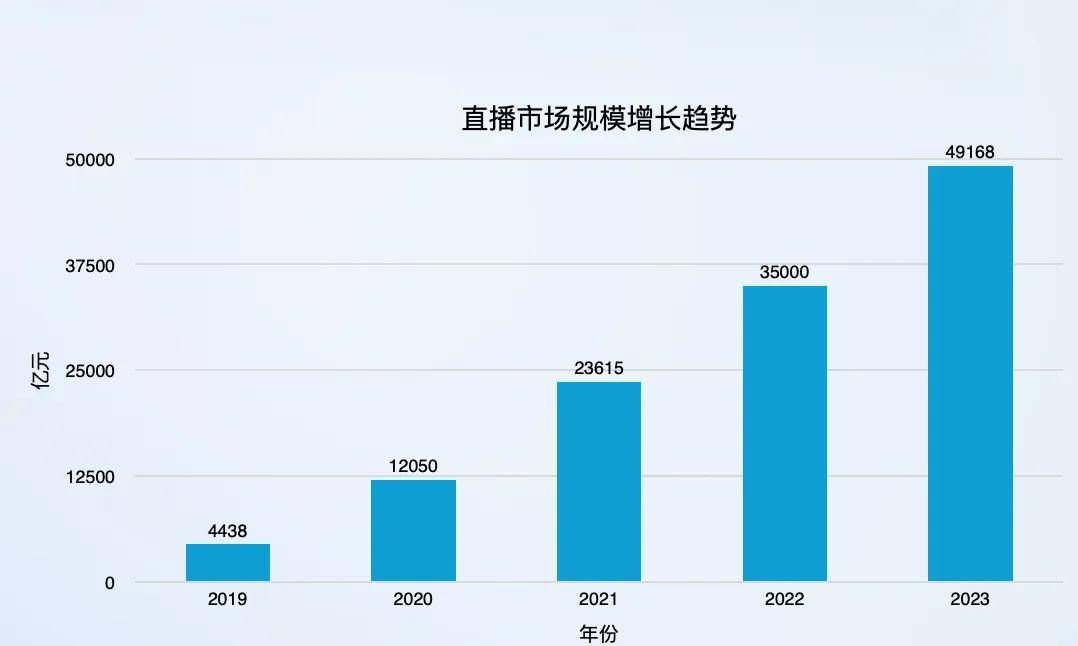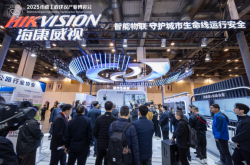AI E-commerce, Baidu Leads the Way
![]() 11/14 2024
11/14 2024
![]() 568
568
The fourth wave of intelligent e-commerce is here, and those who get in first will dominate. This time, Baidu is the leader.
Written by Wan Tiannan
Edited by Chen Jiying
In the fiercely competitive e-commerce industry, only live streaming sales have maintained high growth. According to the 'China Live Streaming E-commerce Industry Research Report' released by iResearch, the scale of China's live streaming e-commerce exceeded 4.9 trillion yuan in 2023.
During the recent Double 11 shopping festival, live streaming sales once again drove significant growth, but many top live streamers were forced to miss out due to controversies—being a top streamer is both glamorous and risky.
Now, there's a new kind of 'streamer' that won't cause controversies—AI digital human streamers.
'These digital humans move, speak, and articulate naturally. If you didn't know, you'd never guess they were digital,' said Baidu Chairman and CEO Robin Li at the Baidu World Conference, as he demonstrated a scene of AI digital human live streaming, drawing gasps from the audience. 'They could be digital avatars of renowned teachers, doctors, lawyers, or salespeople,' Li added as an example.
Regarding its prospects, Li is very optimistic. 'Intelligent agents are the most mainstream form of AI application and are about to explode in popularity,' he said, and AI digital humans are a typical example of role-based intelligent agents.
Baidu's ambitions in the e-commerce industry extend beyond live streaming sales. Baidu Preferred, driven by large AI models, is spearheading intelligent e-commerce.
In fact, Baidu is not alone. AI reshaping e-commerce is a consensus in the industry. For example, Taobao and JD.com have successively launched intelligent shopping assistants such as Taobao Ask and Jingyan.
Li Mingtao, chief expert at the China International Electronic Commerce Center, also wrote an article asserting that AI is ushering in a new era of intelligent shopping.
1
Trillion-yuan live streaming sales, with AI streamers taking the lead
The high growth of live streaming e-commerce continues.
According to iResearch estimates, the annual compound growth rate of China's live streaming e-commerce market from 2024 to 2026 is expected to be 18.0%, significantly higher than the overall e-commerce growth rate.

While the opportunity in live streaming sales is clear, it's not easy for businesses to ride the wave to success.
First, top streamers have stringent partnership requirements, making it difficult for many companies to gain access.
Even if a company secures a partnership, top streamers often demand terms that are unfavorable to businesses, such as requiring the 'lowest price,' stripping businesses of their pricing power and initiative for development.
Even if all requirements are met, sales results may not meet expectations. A week ago, Zhou Chengjian, founder of Metersbonwe, publicly complained that many influencer collaborations fell short of expectations.
At the same time, the placement fees and commissions charged by third-party influencers are also substantial. Commission rates for different product categories typically range from 10% to 50%, placing a heavy burden on businesses.
With high commissions and the need to comply with streamers' demands for the 'lowest price,' businesses are squeezed on both ends, inevitably compromising on quality.
As a result, more and more companies are building their own streaming teams. However, the upfront investment, professional expertise, and operational costs of self-streaming are high, making it difficult for a large number of small and medium-sized enterprises, especially individual merchants without content creation capabilities, to share in the benefits of live streaming sales.
Amidst these challenges, AI digital humans provide a new live streaming solution—Huiboshi. As a leader in intelligent e-commerce, Baidu first scaled the use of digital human streamers on Baidu Preferred during last year's Double 11.
As the ripple effect spreads, more and more leading brands and long-tail merchants have benefited from Huiboshi over the past year, successfully implementing the AI digital human live streaming model.
Skyworth, a home appliance giant, is one such example. Its digital human live streaming room has achieved stable daily GMV growth of 20,000 yuan and reached a peak GMV of 68,000 yuan in a single live stream, with a 45.7% increase in order conversion rate compared to real-life streamers.
Not only leading companies but also small and micro-enterprises and even individual users can easily take advantage of the live streaming trend through Huiboshi. Han Bing, the head of Guanxin Lab, which focuses on adolescent mental health, has benefited greatly from this.
Mental health has a high professional threshold, but Han Bing's digital human avatar perfectly replicates her voice, appearance, and movements. It can efficiently integrate professional knowledge from across the web, present convincing arguments in an accessible manner, and mimic Han Bing's speaking style, maximizing her IP value and converting over 5,000 monthly orders, while reducing live streaming operational costs by 78%.

Not only applicable to brands and merchants of different sizes, from large to small, Huiboshi's digital human live streaming solution can also be used in various industries, such as the apparel industry, the largest category in e-commerce.
Entering the live streaming room of Dazhijia Women's Wear, a young female streamer confidently showcases a gray coat in front of the camera. She turns her head and body in mid-to-long shots to demonstrate different angles, then moves closer for close-ups of the fabric and craftsmanship, displaying a level of proficiency and professionalism on par with real-life female fashion streamers. This seamless performance by the AI female streamer ultimately helped the merchant double its sales during the off-season, with a monthly GMV exceeding 150,000 yuan.
Celebrities and influencers can also easily replicate their own AI digital human streamers using Baidu's Huiboshi. For example, Bao Bei'er's AI digital human helped him top the weekly list of celebrity sales on the Baidu Preferred platform.
As merchants and brands of various sizes and from different industries continue to successfully implement AI digital human live streaming, its promising future is becoming a consensus in the industry. Ma Qianli, dean of the China AIGC Industry Alliance Research Institute, even predicts that '90% of e-commerce live streaming could be handled by AI digital humans in the future.'
The trillion-yuan live streaming sales trend is waiting for more AI digital human streamers to join.
2
What is the value of AI streamers?
Businesses and brands are flocking to join the trend of AI digital human live streaming due to its clear and quantifiable value in cost reduction and efficiency enhancement.
For major brands, AI digital human live streaming can drive high-quality business growth.
First, it extends live streaming hours. A single digital human streamer on Huiboshi can replace an entire live streaming team, working tirelessly 24/7 at low cost to meet consumers' needs around the clock and in various scenarios.
Take Skyworth as an example. Its live streaming room has both real-life and AI streamers, complementing each other to cover different times and platforms.
Second, it reduces costs and enhances efficiency. In addition to the previously mentioned Skyworth, Han Bing, and Dazhijia Women's Wear, the new energy vehicle brand Jiyue is also a beneficiary.
Currently, competition in the new energy vehicle sector is fierce. Jiyue leveraged AI digital human live streaming to drive growth. During the launch of its new vehicle, it set up a digital human live streaming matrix consisting of four live streaming rooms, showcasing the new vehicle in full-vehicle and outdoor test drive scenarios, ultimately effectively increasing lead generation by 20% and test drive rates to 8%.

Such efficiency enhancements are not isolated cases but are widespread. Huiboshi has helped tens of thousands of merchants achieve growth, with an average GMV increase of about 62%.
For small and micro-enterprises without live streaming capabilities, AI digital humans can help them step onto the live streaming trend with minimal barriers to entry.
Many small and micro-enterprises cannot afford professional streamers, lack scriptwriters, or have sufficient live streaming venues. To address this, Huiboshi provides a 'one-click AI full-stack generation' solution: within just 5 minutes, merchants can create a complete digital human live streaming room with just a few simple steps, achieving one-click live streaming with almost no barriers to entry. Moreover, the costs are low, with the setup cost of digital human live streaming being only one-twentieth that of real-life streamers, and operating costs reduced by 80%.
Furthermore, AI digital humans can also help MCN agencies explore new models for streamer incubation. For example, with the support of Huiboshi, the MCN agency Baiweixinjie can incubate a high-quality streamer in just three days, increasing the number of successfully incubated streamers by 184%.
However, as Robin Li said, intelligent agents, including AI digital humans, may seem to have a low barrier to entry but actually have a high ceiling.
Many players have entered the AI digital human arena, but there are also common pain points and shortcomings in their products, such as distorted images, stiff movements, monotonous tones, lack of interaction, poor viewing experience, and low conversion efficiency.
How does Huiboshi, which entered the market early, address these pain points?

As a leading player in China's AI industry, Baidu has long accumulated full-stack AI capabilities and ranks first in artificial intelligence patents in China. Standing on the shoulders of this giant, Huiboshi naturally starts from a high technical foundation.
As the industry's first AI full-stack digital human live streaming solution, Huiboshi is versatile, capable of handling the main tasks in live streaming rooms, including intelligent streamers, scripts, interactions, presentations, and scene control.
For example, to address the technical difficulty of stiff movements in AI digital streamers, Huiboshi achieves a 1:1 replication of real-life speaking expressions with natural lip synchronization and facial expressions. It is also the first in the industry to introduce 2D portrait modeling capabilities that can be obscured and rotated at large angles, enabling free recording with stronger expressiveness and precise semantic matching. Whether standing, sitting, or turning, its movements and expressions are natural and lifelike.
To address the issue of poor interactivity in AI digital humans, Huiboshi's AI streamers can interact directly with users in the live streaming room, supported by the Wenxin large model. They can not only respond to users' questions but also avoid model hallucinations to ensure accurate replies. They can even proactively initiate topics and guide user interactions based on different live streaming goals such as increasing popularity, attracting followers, and promoting orders, with control effects comparable to those of professional real-life streamers.
For example, in the case of women's clothing, a non-standardized category, users' questions tend to be highly personalized. The AI streamer for Dazhijia Women's Wear can simultaneously handle different questions from multiple users and provide professional answers, seamlessly transitioning from 'insight' into viewers' potential needs to 'mobilizing' them to place orders efficiently.

The decoration of Huiboshi's live streaming room can also be completed with one click by AI, enabling intelligent camera switching—for example, showing full-body outfits in long shots and close-up details in close-ups, resulting in a 70% increase in average viewing time and a 55% increase in effective viewing rates.
Huiboshi's prowess in live streaming sales is just a glimpse of Baidu's efforts to apply large AI models across various industries.
As Robin Li said, how large AI models can create incremental value for enterprises in various industries is a question that Baidu has been exploring. Rather than launching a 'super app,' Baidu aims to create millions of 'super useful' applications.
3
Intelligent e-commerce, creating incremental value
Robin Li asserts that AI is bringing about an industrial revolution, transforming various industries. For the e-commerce industry, Baidu's ambitions are not limited to live streaming sales but aim to spark a new wave of intelligent e-commerce.

China's e-commerce industry has gone through four stages: shelf e-commerce represented by Taobao and JD.com, social e-commerce represented by Pinduoduo, and content e-commerce represented by Douyin and Kuaishou.
In the first three waves, new e-commerce giants emerged from the side. Now, the fourth wave of intelligent e-commerce is surging, with Baidu Preferred leading the way.
What is intelligent e-commerce? Ping Xiaoli, Vice President of Baidu and General Manager of Baidu E-commerce, provides a clear definition—driven by powerful large AI models and based on a strong mobile ecosystem and deep AI accumulation, intelligent e-commerce can empower merchants on the supply side to reduce costs, enhance efficiency, and achieve high-quality growth, while comprehensively optimizing the consumer experience on the demand side to 'understand your thoughts, know your needs, and solve your worries.'
Measured by the four key elements of e-commerce—technology, traffic, scenarios, and supply—as a latecomer, intelligent e-commerce does not homogenize or compete with existing e-commerce forms but brings new incremental value.
From the perspective of technological evolution, artificial intelligence serves as the technological foundation of intelligent e-commerce. Baidu Preferred integrates various AI capabilities such as digital humans, intelligent shopping guides, product selection, and advertising to drive comprehensive improvements in user consumption experiences and merchant operational efficiency.
From the perspective of traffic, e-commerce is ultimately a traffic business, and the number of users defines the upper limit of e-commerce scale. Currently, Baidu APP has an astonishing 704 million monthly active users who frequently search for and consume information on Baidu, objectively revealing their consumption demands and preferences. Baidu Preferred can effectively capture this massive traffic and extend its value from information satisfaction to product and service satisfaction.
Each wave of e-commerce is also marked by the evolution and iteration of scenarios. Unlike the first three waves, Baidu Preferred integrates search, recommendation, and browsing, creating an 'invisible but powerful' experience that covers all scenarios from 'people finding products' to 'products finding people.'
Unlike shelf and content e-commerce, which only provide relatively standardized services, Baidu's intelligent search and recommendation system can offer personalized e-commerce service experiences. Relying on Baidu's understanding of massive user data, the capabilities of the Wenxin large model, and a rich e-commerce knowledge graph, e-commerce search can better understand users amidst free-form and complex expressions and better understand products amidst massive and multidimensional information, achieving more precise product-user matching. Features such as full-network price comparisons, reviews, and purchasing advice offer new interactions and satisfaction, with open and objective characteristics that transcend the self-interest of single platforms and merchants. Based on content and product data across the entire network, it efficiently provides users with optimal solutions.
For example, when homeowners shop for washing and drying machines, they need to consider complex variables such as price, performance, and size. In traditional e-commerce models, users either navigate different brands on shelf e-commerce platforms, studying product details one by one, or wait passively in live streaming rooms for streamers' explanations. However, neither model is efficient for consumption decision-making. These tedious tasks can be replaced by AI on Baidu E-commerce, directly providing optimal options and assisting users in making efficient decisions.
As a latecomer, Baidu Preferred's relative shortcoming lies on the supply side. However, considering the high level of competition in the retail industry today and the common challenge of achieving high-quality growth across various industries, merchants and brands are eager for the opportunities presented by new platforms.
Baidu Preferred has launched a series of incentive policies, including zero-threshold entry, high traffic support, low commissions, and high subsidies, and has set clear small goals—to create 100 merchants with annual sales exceeding 100 million yuan, 100 influencers with annual sales of ten million yuan, and 50 service providers with GMV exceeding 100 million yuan.
Today, many pioneers have already reaped the early benefits.
Baidu Preferred launched the Effortless Choice series IP this year to help high-quality merchants achieve business transformation. Among them, Jingrui Jewelry, which has been selected by Expert Choice, joined the Baidu platform in January 2024. In just two months, the team grew to over 160 people, and has now achieved a full industrial chain layout encompassing live streaming, image-text e-commerce on shelves, offline physical stores, jade processing factories, and more.
Oumandy Fur, a merchant in the industrial belt selected by Origin Choice, is headquartered in Haining, the largest production base for fur and leather clothing in China, and is a leading enterprise in the local area. After joining Baidu Preferred's Origin Choice IP, its monthly GMV quickly achieved breakthrough growth.
According to official disclosures, in May this year, Baidu Preferred's GMV increased by 227% year-on-year, with the number of transacting users and active merchants increasing by 283% and 242% respectively, far outpacing the overall growth rate of the e-commerce market.
The fourth wave of e-commerce dividends has already arrived in full force. Whoever enters the market first will have the upper hand. This time, Baidu has become the navigator.




